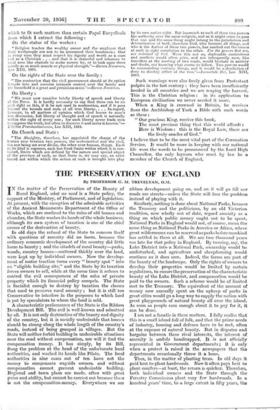THE PRESERVATION OF ENGLAND
By PROFESSOR G. M. TREVELYAN, O.M.
IN the matter of the Preservation of the Beauty of 1 Rural England, what we need is a State policy, the support of the Ministry, of Parliament, and of legislation. At present, with the exception of the admirable activities of the Ancient Monuments Department of the Office of Works, -which are confined to the ruins of old houses and churches; the State washes its hands of the whole business, although its own system of taxation is one of the chief causes of the destruction of beauty.
In old days the refusal of the State to concern itself with questions of amenity did no harm, because the ordinary economic development 'of the country did little harm to beauty ; and the citadels of rural beauty—parks, woods, country houses—scattered thickly over the land, were kept up by individual owners. Now the develop- ment of motor traction turns every " beauty spot " into an "eligible building site," and the State by its taxation forces owners to sell, while at the same time it refuses to control the evil consequences of the sales of private property which its financial policy compels. The State is Socialist enough to destroy by taxation the classes that used to preserve rural amenity ; but it is still too Conservative to interfere in the purposes to which land is put by speculators to whom the land is sold.
A characteristic performance of the State is the Ribbon Development Bill. The evil is well -known and admitted by all. It is not only destructive of the beauty and dignity' of the country, but it is socially undesirable that houses should be strung along the whole length of the country's roads, instead of being grouped in villages. But the State will neither forbid building in undesirable situations near the road without compensation, nor will it find the compensation money. It has simply, by its Bill, flung the problem at the head of the unfortunate local authorities, and washed its hands like Pilate. The local authorities in nine cases out of ten have not the money to compensate wayside owners, and • without compensation cannot prevent undesirable building. Regional and town plans are made. often with great pains and ability, but cannot be carried out because there is not the compensation-money, Everywhere we see ribbon development going on, and on it will go till our roads are streets—unless the State will face the problem instead of playing with it.
Similarly, nothing is done about National Parks, because the Treasury and the politicians, by an old Victorian tradition, now wholly out of date, regard amenity as a thing on which public money ought not to be spent. National Parks in England would not, of course, mean the same thing as National Parks in America or Africa, where great wildernesses can be reserved as parks before mankind has settled in them at all. We are two thousand years too late for that policy in England. By turning, say, the Lake District into a National Park, ownership would be undisturbed, and agriculture and sheepfarming would continue as it does now. Indeed, the farms are part of the beauty of the landscape. Only the rights of owners to develop their properties would be limited by certain regulations, to ensure the preservation of the characteristic beauty of the Lake District, and compensation would be paid to the owners. Such a scheme would be of limited cost to the Treasury. The equivalent of the amount of money now annually spent on the upkeep of parks in great cities would go a long way to supply the nation with great playgrounds of natural beauty all over the island. As soon as people care enough about it to pay for it, it can be done.
I am not a fanatic in these matters. I fully realise that this is a small island full of folk, and that the prime needs of industry, housing and defence have to be met, often at the expense of natural beauty. But in disputes and bargains between these rival interests, the interest of amenity is unduly handicapped. It is not officially represented in Government departments ; it is only when a protest is raised in the newspapers that the departments occasionally throw it a bone.
Thus, in the' matter of planting trees. In old days it paid best to plant hardwoods. Now it often pays best to plant coniferi—at least, the return is quicker. Therefore, both individual owners and the State through the' Forestry Commission plant very few hardwoods. In a hundred years' time, to a large extent in fifty years, the beauty of England would be only half what it is now from that cause alone. Look at any typical English landscape other than pure moorland, and see if its beauty is not mainly dependent on the hardwood trees. Well, they fall ; and when they fall they are not now being replaced. Almost every new plantation one sees is conifer. The only remedy is that both individuals and the State should deliberately plant more hardwoods. There is no use abusing the Forestry Commission, which makes about as many concessions to amenity as its commission from Government allows,—for example, its recent agreement to keep out of the heart of the Lake District and to consult the C.P:R.E. in other places. What is wanted now is that Government should modify its policy and charge the Forestry Commission with the business of planting more hardwood and allow it to acquire land suitable for that purpose. At present it is much restricted by its orders from so doing. It is for the nation to decide what sort of forests it wants to plant.
But in any case the Forestry Commission can't maintain the small plantations and coppices and hedgerow timber. That can only be done by private owners, small and big. What we want is that they should feel it a duty to pos- terity to put in hardwood trees, even if it be only a few, to mitigate the inevitable deterioration of the English landscape in the future. " When ye hae naething else to do, ye may be aye sticking in a tree ; it will be growing, Jock, when ye're sleeping." Lay not that flattering unction to your souls that the National Trust is solving the problem Of rural amenity. It has indeed made great headway in the last few years, but even now it owns only some 60,000 acres, with 10,000 more protected by its covenants. What are they among so many ? Recently a patriotic owner gave a' strip of live miles of Cornish coastline to the Trust. That is good, and there are a few more such cases. But elsewhere, with appalling speed, the coast-line of England is being desecrated and its majestic and lovely beauty is being destroyed for ever. Nothing but action by the State or local authorities can save the coast line on a large scale.
Yet in the meantime the C.P.R.E. and National Trust do what they can, and through than the patriot can do something at least to save the beauty of his country, until the State has been aroused to do its duty. A thousandth part of a loaf is better than no bread. I would particularly commend to your readers the practice, which recent legislation has rendered possible, of owners placing lands under covenant, either with lo2a1 autho- rities or with the National Trust. By these covenants lands can be placed out of the shot of the jerry builder and exploiter for all time to come, into whatsoever hands the lands may pass. The owner does not, under this system, give up ownership or the rents. But he foigoes further development value and prevents himself and his heirs from selling it as building land. This arrangenient is proving more and more attractive to owners who care for particularly beautiful pieces of the land they own.





























































 Previous page
Previous page